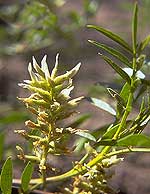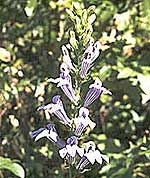| Back | Herbal Archives | |
Licorice Root
 |
Licorice is indiginous to south central Europe and Asia. The ancient Scythian nomad tribes used licorice widely because of its ability to assist the body in retaining water. Glycrrhizic acid, which is extracted from the licorice root, increases retention of sodium and water. The ancient Greeks imported licorice as a medicinal herb, calling it "Scythian root." It has been used since the third century BC to help dissipate coughs and sore throats. Today, licorice root is said to be beneficial as a treatment for hypoglycemia, bronchitis, colitis, diverticulosis, gastritis, stress, colds, nausea and inflammation. It is also known as an aide to adrenal gland function, and as a remedy for hormonal disturbances in women. Pregnant women and people with cholestatic liver disorders, liver cirrhosis, hypertonia, hypokalemia, and severe kidney insufficiency should avoid the use of licorice root. |
Lobelia
 |
The North American herb Lobelia is found primarily east of the Mississippi River, from Canada to Louisiana. Lobelia has been called the "thinking herb" due to the fact that its effect is felt wherever it is needed in the body. It was once approved by the FDA as an aide in stopping smoking because the chemical structure of lobeline, its main alkaloid, is similar to nicotine, yet is not habit forming. Lobelia may be used to assist in the treatment of asthma, whooping cough, hysteria, tetanis, strychnine poisoning, and to lessen the strength of contractions during childbirth. As a powerful anti-spasmodic, lobelia is also used effectively in counteracting spasms in various parts of the body, thus is helpful in treating epilepsy. Caution: an overdose of lobelia may produce vomiting, excessive salivation, lowered blood pressure, diarrhea, disturbed hearing and vision, mental confusion and bodily weakness. When used in small or moderate doses, it has been found to be quite safe and effective, although it is not recommended for pregnant women or patients with heart dysfunctions. |
Copyright 2022 - Lyn Hopkins